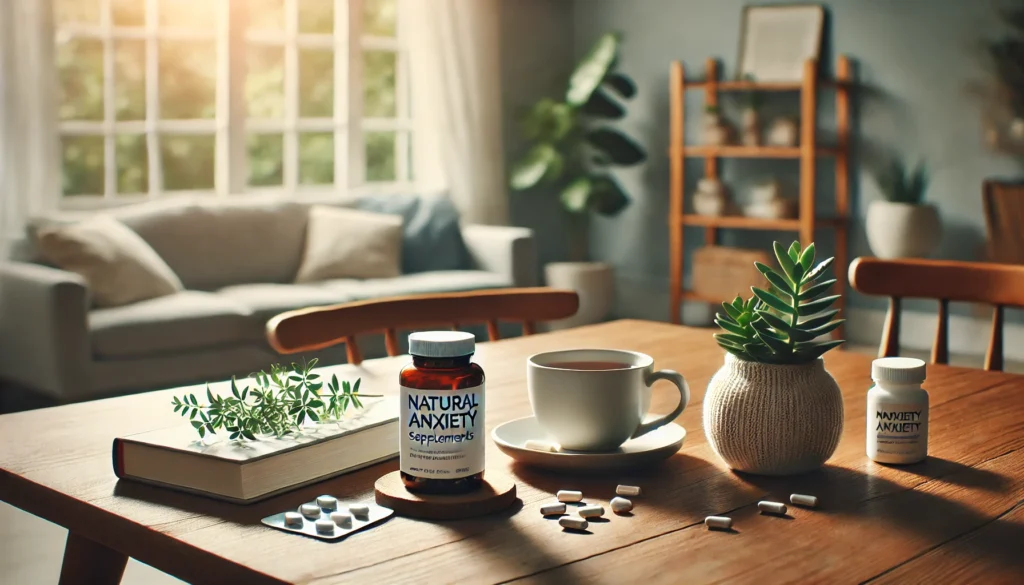In today’s fast-paced world, anxiety has become a common challenge for many individuals seeking to maintain mental and emotional well-being. While prescription medications are often used to manage anxiety disorders, there’s a growing interest in over-the-counter (OTC) options. This article will delve into the realm of OTC anxiety medications, highlighting their potential benefits, limitations, and the considerations one should make before opting for these alternatives.
You may also like: Natural Supplements for Effective Anxiety Relief

Understanding Anxiety and Its Impact
Anxiety is more than just occasional worry or stress. It can manifest as persistent feelings of apprehension, unease, and fear, which can significantly impact daily life. According to the Anxiety and Depression Association of America, anxiety disorders are the most common mental illness in the U.S., affecting 40 million adults annually. Despite being highly treatable, only a small percentage receive adequate treatment.
The Prevalence of Anxiety Disorders
Anxiety disorders encompass various conditions, including generalized anxiety disorder, panic disorder, and social anxiety disorder. These conditions can disrupt daily activities, relationships, and overall quality of life. The increasing prevalence highlights the need for accessible treatment options, including OTC solutions.
Symptoms and Diagnosis
Understanding anxiety symptoms is crucial for diagnosis and treatment. Common symptoms include excessive worry, restlessness, fatigue, irritability, and difficulty concentrating. A proper diagnosis by a healthcare professional ensures that individuals receive the most effective treatment tailored to their specific needs.
Impact on Daily Life
The impact of anxiety extends beyond mental discomfort. It can lead to physical symptoms like headaches, muscle tension, and digestive issues. Additionally, untreated anxiety may contribute to other mental health disorders, making early intervention and effective management essential.
The Search for Non-Prescription Solutions
As awareness of mental health issues grows, so does the demand for accessible, non-prescription solutions. OTC medications for anxiety appeal to many because they are easily obtainable and generally perceived as having fewer side effects than their prescription counterparts. However, it’s crucial to understand what these medications can and cannot do.
Reasons for Seeking OTC Options
Many individuals seek OTC options due to the stigma associated with prescription medications or mental health treatment. Others may prefer OTC remedies for their perceived natural benefits or due to financial considerations, as they often do not require a doctor’s visit.
Accessibility and Ease of Use
OTC medications are widely available at pharmacies and health stores, making them convenient for those who may not have easy access to healthcare services. Their availability without a prescription allows individuals to try different options and find what works best for them.
Limitations of OTC Solutions
While OTC remedies offer accessibility, they are not without limitations. They may not address the root cause of anxiety and are often best suited for temporary relief or mild symptoms. Understanding these limitations is crucial for setting realistic expectations.

Types of Over-the-Counter Anxiety Medications
OTC anxiety medications come in various forms, including herbal supplements, nutritional supplements, OTC medications, and homeopathic remedies. Each type offers unique benefits and considerations for those seeking relief from anxiety.
Herbal Supplements
Herbal supplements have been used for centuries in traditional medicine to alleviate stress and anxiety. Some popular options include:
- Valerian Root: Often used as a sleep aid, valerian root is believed to have calming effects that may help reduce anxiety. Its effects on the nervous system can promote relaxation and improve sleep quality, which is often disrupted by anxiety.
- Kava: Known for its sedative properties, kava has been used in some cultures to promote relaxation and ease anxiety. However, potential liver toxicity requires careful monitoring and consultation with a healthcare provider.
- Passionflower: This herb is thought to boost gamma-aminobutyric acid (GABA) in the brain, reducing anxiety symptoms. Its calming properties may also aid in sleep, making it a dual-purpose supplement for those with anxiety-related insomnia.
Nutritional Supplements
Certain vitamins and minerals play a role in mental health, and their supplementation could potentially aid in anxiety relief:
- Magnesium: Essential for numerous bodily functions, magnesium deficiency has been linked to increased anxiety. Supplementing with magnesium can support stress reduction and improve mood, although individual responses may vary.
- Vitamin B Complex: B vitamins are vital for brain health. They help produce neurotransmitters that regulate mood and stress. Adequate levels of B vitamins can enhance energy levels and cognitive function, potentially reducing anxiety symptoms.
- Omega-3 Fatty Acids: Found in fish oil, omega-3 fatty acids are known for their anti-inflammatory properties and potential benefits for mental health. Regular supplementation may improve mood and reduce anxiety symptoms.
OTC Medications
While not specifically labeled for anxiety, some OTC medications can alleviate symptoms indirectly:
- Antihistamines: Certain antihistamines like diphenhydramine may have sedative effects that help calm nerves. Their use for anxiety is typically short-term, and they may cause drowsiness or other side effects.
- Melatonin: While primarily used for sleep disorders, melatonin can help regulate sleep patterns disrupted by anxiety. Its role in managing circadian rhythms can indirectly benefit anxiety sufferers by promoting restful sleep.
- Non-Sedative Options: Some individuals may prefer non-sedative OTC medications that offer mild anxiety relief without causing drowsiness. These options are often used in combination with lifestyle changes for optimal results.
Homeopathic Remedies
Homeopathy offers a range of remedies purported to relieve anxiety symptoms. Although research on their efficacy is limited, some individuals report benefits from options like:
- Arsenicum Album: Used for anxiety associated with restlessness. It is often recommended for individuals experiencing fear of illness or insecurity.
- Gelsemium: Targeted towards fear-related anxiety. It may be helpful for those dealing with anticipatory anxiety or performance-related stress.
- Ignatia: Often used for anxiety stemming from grief or emotional distress. It is considered suitable for individuals experiencing mood swings or emotional sensitivity.
The Science Behind OTC Anxiety Medications
Understanding the science behind OTC anxiety medications is essential for evaluating their effectiveness and safety. While some options have been studied extensively, others rely on anecdotal evidence and traditional use.
Efficacy and Limitations
The effectiveness of OTC anxiety medications can vary widely among individuals. While some find significant relief, others may experience little to no benefit. It’s important to remember that these treatments are generally best suited for mild to moderate anxiety and should not replace professional medical advice or prescription medication for severe conditions.
Research and Evidence
Scientific research on OTC anxiety medications is ongoing, with varying levels of evidence supporting their use. Some supplements, like omega-3 fatty acids and valerian root, have more robust research backing their effectiveness, while others rely on traditional use and limited studies.
Safety and Side Effects
Despite being available without a prescription, OTC medications are not without risk. Herbal and nutritional supplements can interact with other medications and may cause side effects. For instance, kava has been linked to liver damage, and excessive valerian root can lead to dizziness or drowsiness. Always consult with a healthcare provider before starting any new supplement or medication.
Interactions with Prescription Medications
OTC anxiety medications can interact with prescription drugs, potentially altering their effectiveness or causing adverse reactions. It’s crucial to disclose all supplements and medications to your healthcare provider to prevent harmful interactions.
Making an Informed Choice
Choosing the right OTC anxiety medication requires careful consideration and consultation with healthcare professionals. Understanding the options and their potential effects is key to making an informed decision.
Consulting Healthcare Professionals
Before considering OTC options, it’s advisable to discuss your symptoms with a healthcare professional. They can help determine if an underlying condition requires treatment or if lifestyle changes and OTC remedies might suffice.
Evaluating Personal Needs and Preferences
Every individual’s experience with anxiety is unique, and personal preferences play a significant role in treatment choices. Factors such as lifestyle, health conditions, and previous experiences with medications should be considered when selecting an OTC option.
Holistic Approaches
In addition to OTC medications, incorporating holistic practices can enhance anxiety management. Techniques such as mindfulness meditation, yoga, regular exercise, and maintaining a balanced diet can contribute to overall mental well-being. These approaches can complement OTC medications, providing a comprehensive strategy for anxiety relief.
Monitoring and Adjusting Treatment
Regular monitoring of symptoms and adjusting treatment as needed is essential for effective anxiety management. Keeping a journal of symptoms and responses to OTC medications can help identify what works best and guide future treatment decisions.

The Future of OTC Anxiety Treatments
With ongoing research into the efficacy and safety of non-prescription anxiety treatments, the future holds promise for more effective and targeted solutions. Advances in understanding the neurobiology of anxiety could lead to the development of new OTC options that offer relief with minimal side effects.
Emerging Research and Innovations
Researchers continue to explore new compounds and formulations for anxiety relief. Innovations in delivery methods, such as transdermal patches or sublingual sprays, may improve the efficacy and convenience of OTC treatments.
Personalized Medicine and Tailored Treatments
The future of anxiety treatment may involve personalized medicine, where genetic and environmental factors are considered to tailor treatments to individual needs. This approach could enhance the effectiveness of OTC medications and reduce the risk of side effects.
The Role of Technology in Anxiety Management
Technology, including mobile apps and wearable devices, is increasingly being used to support anxiety management. These tools can track symptoms, provide relaxation techniques, and offer reminders for medication and lifestyle practices.
Conclusion
Exploring over-the-counter anxiety medications opens up a realm of possibilities for those seeking alternative or supplementary methods for managing anxiety. While these options may provide relief for some, they are not a substitute for professional medical care. Always approach OTC anxiety treatments with caution and consult with healthcare providers to ensure they are appropriate for your individual needs.
By understanding the spectrum of OTC options available and their implications, individuals can make informed choices that contribute to their journey toward mental wellness. The journey toward managing anxiety is personal and multifaceted, and combining OTC treatments with professional guidance and lifestyle changes can lead to more effective and sustainable outcomes.
Further Reading:
Are There Any Over-The-Counter Anxiety Medications?
Herbal treatment for anxiety: Is it effective?
Can You Use Benadryl for Anxiety?
Important Note: The information contained in this article is for general informational purposes only, and should not be construed as health or medical advice, nor is it intended to diagnose, prevent, treat, or cure any disease or health condition. Before embarking on any diet, fitness regimen, or program of nutritional supplementation, it is advisable to consult your healthcare professional in order to determine its safety and probable efficacy in terms of your individual state of health.
Regarding Nutritional Supplements Or Other Non-Prescription Health Products: If any nutritional supplements or other non-prescription health products are mentioned in the foregoing article, any claims or statements made about them have not been evaluated by the U.S. Food and Drug Administration, and such nutritional supplements or other health products are not intended to diagnose, treat, cure, or prevent any disease.


